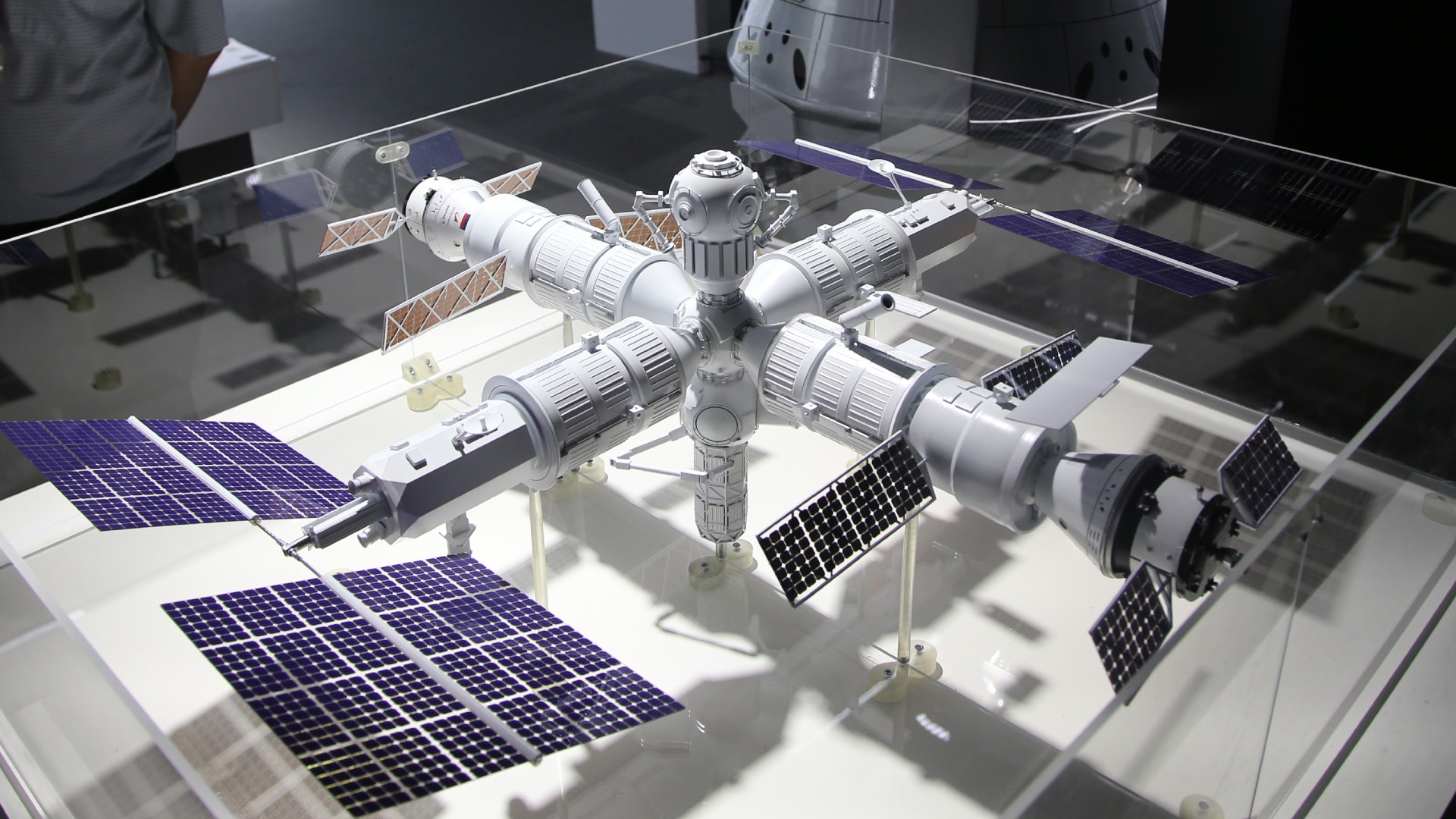Russia unveils timeline for building its new space station, starting in 2027
The schedule for building the station depends on the success of Russia's next-generation heavy-lift Angara A5 rocket.

Russia has unveiled a comprehensive roadmap for building its newest space station and associated Earth-based infrastructure, with the first modules expected to launch within three years.
On July 2, the leadership of Russia's space agency Roscosmos described their upcoming mission to create the nation's newest space station, currently known as the Russian Orbital Service Station (ROSS), according to Russian news agency TASS.
The first module of the X-shaped outpost, a research and power node, is expected to be launched into a near-polar orbit in 2027, TASS reported. By 2030, it plans to have docked its four major modules, with two "special-purpose" modules scheduled for attachment by 2033. Roscosmos plans to send the first cosmonauts to the station in 2028 and has suggested the station can be operated without crew.
The Russian Orbital Service Station would orbit at the same altitude as the International Space Station, around 250 miles (400 km) above Earth, in a polar, sun-synchronous orbit. The route is particularly useful for observing the entire surface of the planet, according to Roscosmos, and also provides a valuable view over "the strategically important Northern Sea Route." The estimated cost is about $7 billion USD.
The schedule for building ROSS also depends on the success of the next-generation heavy-lift Angara A5 rocket, which has had three successful orbital flight tests since 2014, and a partial failure in 2021.
Its construction is also likely to contain a first: Russia is riding the AI hype rocket, it seems.
"Artificial intelligence is quickly developing technology." said Vladimir Kozhevnikov, chief designer of ROS, on July 2, according to a report by TASS. "We will use its support but basically we will use our brains, of course," What form this AI takes is unknown — will ChatGPT get a building credit on ROSS modules?
Breaking space news, the latest updates on rocket launches, skywatching events and more!
Another chief designer, Vladimir Solovyov of space rocket company Energia, has suggested there will be "unusual" goals for ROSS, with the space station providing guidance for a fleet of satellites — a first.
"This fleet will fly near the station […] this, too, will imply brand-new tasks for mission control as no one has ever endeavored to do so," Solovyov said.
Russia has been a principal member of the International Space Station since launch, alongside NASA, the European Space Agency, JAXA and the Canadian Space Agency. For its new station, it's looking at partnerships with Brazil, India, China and South Africa, in addition to other African countries.
Back in 2021, Roscosmos signaled its intention to build its own space lab, a successor to its Mir space station. In mid-2022, after the invasion of Ukraine and heightened tensions between Russia and other Western countries, Roscosmos announced it would leave the ISS program 'after 2024.' It has since announced it will remain on the ISS until 2028.
Though the timeline for departing the ISS remains uncertain, the schedule signals the Russian space agency's intent to advance its own interests and focus on security and scientific development Roscosmos believes has been hindered due to international agreements on the ISS.
The ISS is expected to undergo a planned deorbit in 2030, but may remain in operation until commercial stations have been built.
Join our Space Forums to keep talking space on the latest missions, night sky and more! And if you have a news tip, correction or comment, let us know at: community@space.com.

Jackson Ryan is a science journalist hailing from Adelaide, Australia, with a focus on longform and narrative non-fiction work. He currently serves as the President of the Science Journalists Association of Australia. Between 2018 and 2023, he was the science editor at CNET. In 2022, he won the Eureka Prize for Science Journalism, which Aussies dub the "Science Oscars." Before all that, he got his doctorate in molecular biology and once hosted a kids TV show on the Disney Channel, called "GameFest." (Good luck finding it.) He lives with a collection of more than 70 Christmas sweaters and zero pets, the latter of which he hopes to rectify one day.
-
newtons_laws Interesting that they are going for a polar orbit. Of course as the article says "The route is particularly useful for observing the entire surface of the planet, according to Roscosmos, and also provides a valuable view over "the strategically important Northern Sea Route". All previous space stations from Russia, China and the US (Skylab and ISS) have been in non-polar orbits, the inclination of the ISS is 51.6°.Reply
One factor about polar orbits is that the crew will receive a higher radiation dose as the Earth's magnetic field diverts charged particles from the solar wind etc towards the poles. -
Unclear Engineer It will be interesting to see how well Russia is able to keep its own schedule.Reply
